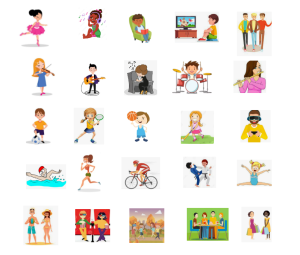35
¿Qué te gusta hacer en tu tiempo libre?

| bailar/escuchar música/leer/ver la televisión/ salir con mis amigos
|
||
| tocar | el violín/la guitarra/el piano/la batería/la flauta | |
| Me encanta…
Me gusta… No me gusta… Odio/Detesto….
|
jugar | al fútbol/al tenis/al baloncesto/al hockey/ a los videojuegos |
| practicar
|
la natación/el atletismo/el ciclismo/el judo/ la gimnasia | |
| ir
|
a la playa/al cine/al parque/al café/de compras | |
Exercises A
Ej. 1a Con tu compañero/a, pregunta y contesta.
- ¿Te gusta (jugar a los videojuegos)?
- No, no me gusta/Sí, me gusta (jugar a los videojuegos).
Ej. 1b Escribe una lista de los pasatiempos que te gusta hacer.
Ejemplo: Me gusta (escuchar música) y (jugar al fútbol).
Grammar
The verb “gustar”
“Gustar” means “to be pleasing”. However, Spanish does use “gustar” in a special way to translate the English “to like”. This is how it works:
The subject of “gusta” is the person or thing that is pleasing. The one to whom it is pleasing is the indirect object introduced by “a”. It can be placed before or after “me gusta” etc.:
|
(A mí) |
(no) |
me |
gusta /gustan |
|
(A ti) |
te |
||
|
A él /A ella /A usted |
le |
||
|
(A nosotros) |
nos |
||
|
(A vosotros) |
os |
||
|
A ellos /A ellas / A ustedes |
les |
Remember that when what you like is plural, you must use “gustan”.
Me gusta la historia.
History is pleasing to me.
Me gustan los libros.
The books are pleasing to me.
However, when “gustar” is followed by an infinitive (meaning “to like doing something”), only the singular form “gusta” can be used.
Me gusta leer y escribir.
I like reading and writing.
Me gusta jugar al fútbol.
I like playing football.
Other verbs which follow this pattern are “encantar” (to love something) and “interesar” (to be interested in something).
Me encanta bailar.
I love dancing.
¿Te interesa tocar la flauta?
Are you interested in playing the flute?
Exercises B
Ej. 2 Fill in the blanks with the correct object pronoun (me, te, le, nos, os or les).
| 1. ¿A Juana y a Elena ________ gusta la natación? | 2. A mí, _______ el ciclismo. |
| 3. ¿A ustedes ______ gustan los videojuegos? | 4. ¿A él _____ gusta el judo? |
| 5. ¿A ti ______ gusta ir de compras? | 6. A Eduardo y a mí _____ gusta leer. |
| 7. ¿A ti y a Raquel _____ gusta bailar? | 8. A Tomás _____ gusta jugar al tenis. |
| 9. ¿A ellas _____ gusta ir a la playa? | 10. A usted _____ gusta ir al café. |
|
Ej. 3 |
Write sentences using the words given. |
|
|
|
eg: Nosotros / gustar / el español –> A nosotros nos gusta el español. | |
|
|
1. Juanita / gustar / la natación y el ciclismo. |
|
|
|
2. mí / gustar / el chocolate. |
|
|
|
3. Usted / gustar / el hotel. |
|
|
|
4. Vosotros / gustar / los profesores. |
|
|
|
5. El profesor / gustar / las vacaciones. |
|
|
|
6. mi padre/ gustar / ir al café. |
|
|
|
7. ellos / gustar / cocinar. |
|
|
|
8. ti / gustar / jugar al voleibol. |
|
Ej. 4 Translate into Spanish.
- _____ gusta la música. (I like music.)
- ¿Te ____ el español? (Do you like Spanish?)
- ____ gustan los Estados Unidos. (They like the U.S.A.)
- Nos ____ los espaguetis. (We like spaghetti.)
- ____ gusta leer libros. (She likes reading books.)
- ¿Os ____ el instituto? (Do you like school?)
- Le gusta ____ al fútbol. (He likes playing football.)
- ____ gusta ____ con mis amigos. (I like going out with my friends.)
- ____ los caballos. (We like horses.)
- ¿____ a los videojuegos? (Do you like playing video games?)
Grammar
Days of the week
on Monday, Tuesday… el lunes, el martes…
on Wednesdays, Thursdays los miércoles, los jueves…
in the weekend el fin de semana
at the weekends los fines de semana
Note: Don’t capitalise days of the week in Spanish.
Exercises C
Ej. 5 Escribe lo que les gusta hacer a tus amigos.
Ej. 6 Trabaja en grupo.
